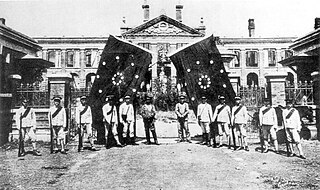
The Wuchang Uprising was an armed rebellion against the ruling Qing dynasty that took place in Wuchang, Hubei, China on 10 October 1911, beginning the Xinhai Revolution that successfully overthrew China's last imperial dynasty. It was led by elements of the New Army, influenced by revolutionary ideas from Tongmenghui. The uprising and the eventual revolution directly led to the downfall of the Qing dynasty with almost three centuries of imperial rule, and the establishment of the Republic of China (ROC), which commemorates the anniversary of the uprising's starting date of 10 October as the National Day of the Republic of China.

The 1911 Revolution, or Xinhai Revolution, ended China's last imperial dynasty, the Manchu-led Qing dynasty, and led to the establishment of the Republic of China. The revolution was the culmination of a decade of agitation, revolts, and uprisings. Its success marked the collapse of the Chinese monarchy, the end of 2,132 years of imperial rule and 268 years of the Qing dynasty, and the beginning of China's early republican era.

Kang Youwei was a prominent political thinker and reformer in China of the late Qing dynasty. His increasing closeness to and influence over the young Guangxu Emperor sparked conflict between the emperor and his adoptive mother, the regent Empress Dowager Cixi. His ideas were influential in the abortive Hundred Days' Reform. Following the coup by Cixi that ended the reform, Kang was forced to flee. He continued to advocate for a Chinese constitutional monarchy after the founding of the Republic of China.
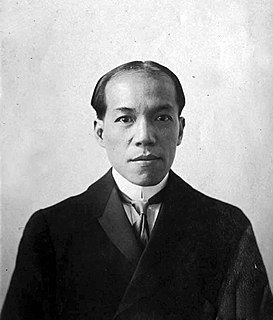
Liang Qichao was a Chinese politician, social and political activist, journalist, and intellectual. His thought had a significant influence on the political reformation of modern China. He inspired Chinese scholars and activists with his writings and reform movements. His translations of Western and Japanese books into Chinese further introduced new theories and ideas and inspired young activists.

Zhang Zhidong was a Chinese politician who lived during the late Qing dynasty. Along with Zeng Guofan, Li Hongzhang and Zuo Zongtang, Zhang Zhidong was one of the four most famous officials of the late Qing dynasty. Known for advocating controlled reform and modernization of Chinese troops, he served as the governor of Shanxi Province and viceroy of Huguang, Liangguang and Liangjiang, and also as a member of the Grand Council. He took a leading role in the abolition of the Imperial examination system in 1905. The Red Guards destroyed his tomb in 1966 during the Cultural Revolution. His remains were rediscovered in 2007 and reburied with honors.
The Gongche Shangshu movement, or Petition of the Examination Candidates, also known as the Scholar's Petition to the Throne, was a political movement in China during the late Qing dynasty, seeking reforms and expressing opposition to the Treaty of Shimonoseki in 1895. It is considered the first modern political movement in China. Leaders of the movement later became leaders of the Hundred Days' Reform.

Zou Rong was a Han Chinese nationalist and revolutionary martyr of the anti-Manchu movement. He was born in Chongqing, Sichuan Province, his ancestors having moved there from Meizhou, Guangdong area. Zou was sent to Japan at an early age, where he studied and observed Japanese modernization.
The Progressive Party was a political party in the Republic of China from 1913 to 1916.

Zhang Shizhao, courtesy name Xingyan, pen name Huangzhonghuang, Qingtong or Qiutong, was a Chinese journalist, educator, politician of the early 20th century known for his advocacy first of revolutionary cultural values in the period leading up to the 1911 Revolution and then of traditional Confucian culture in following years.
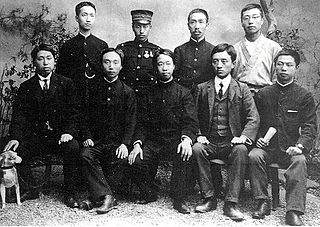
The Huaxinghui, commonly translated as the China Revival Society or China Arise Society, was founded by Huang Xing and Zhang Shizhao on 15 February 1904 with the election of Huang Xing as its president, in Changsha of Hunan for the explicit political goal of overthrowing the Qing dynasty and establishing a democratic and free country. Many of its members later became key figures of the Tongmenghui.
Jin Tianhe was a scholar, poet, politician, and writer from the Anhui Province. Jin Tianhe is most well-known for publishing the first Chinese feminist manifesto, The Women's Bell. Other popular works include Jiangsu, The Weekly Independent, A Flower In A Sinful Sea, and The Grand Magazine. Jin Tianhe was born into nobility during the Qing era and received an elite education, but was greatly critical of the government and supported the overthrow of the Qing. Themes of Jin Tianhe's work include racial envy, gender equality, women's rights, and national salvation. Through his work, Jin Tianhe expressed his desire for gender equality and criticized the backwardness of China's social relations and government, while praising the West for their non-oppressive ideologies. Although his work was influential, it was often debated by other scholars and critiqued for being overly progressive and ignorant of contemporary realities. Currently, his contributions to the feminist movement is still expressed by a large number of actors through media, books, and speeches.
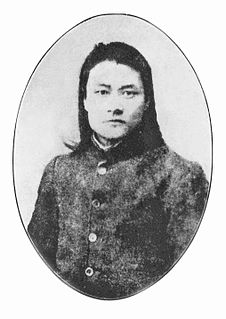
Chen Tianhua was a Chinese revolutionary born in Xinhua, Hunan province to a poor peasant family during the Qing dynasty.

Towards the Republic, also known as For the Sake of the Republic and Zou Xiang Gong He, is a Chinese historical television series first broadcast on CCTV in China from April to May 2003. The series is based on events which occurred in China in the late 19th century and early 20th century, and led to the collapse of the Qing dynasty and the founding of the Republic of China. Because the series portrayed historical issues to which the current Chinese government remains politically sensitive, the series has been subjected to censorship in mainland China.
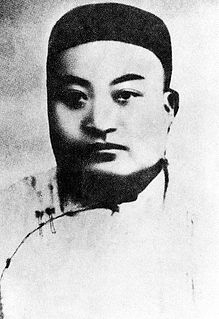
Tang Caichang was a late Qing dynasty revolutionary and political activist. He and fellow reformer Tan Sitong were from Liuyang. Tang was chosen by Kang Youwei to lead an uprising in Hankou, however he and thirty others were arrested by Qing forces before it ever began on August 21, 1900. By order of Zhang Zhidong, he was beheaded the following day in Wuchang. He is considered by the Chinese to be a martyr for revolution.

Lin Zongsu was a Chinese suffragist and writer. She founded the first women's suffrage organization in China and was one of China's most noted political feminist activists in the Qing-early Republican period. She also became one of China's first woman journalists and newspaper editors. As a journalist, she published widely on women's rights and led several women's organizations until democracy was suppressed in 1913. In later life, she taught in Singapore and ran a boating enterprise there which was able to finance her brother's newspapers in China. After a decade in Southeast Asia, she and her husband returned to China and lived in the southern part of the country where their business operations were located.
Chen Xiefen, a Chinese feminist, revolutionary and journalist of the Qing era, is regarded as one of the first progressive Chinese women to utilize the press to further women’s rights. From 1899 to 1903, Chen published Nübao, where she advocated for women's education, gender equality and economic independence. After her paper was banned in 1903, Chen Xiefen emigrated to Japan, where she briefly continued to print Nübao. Chen Xiefen remained active in anti-Qing revolutionary circles until her fall from the public eye in 1911.
The following lists events that happened during 1903 in China.
The following lists events that happened during 1904 in China.
A Study of Confucius as a Reformer of Institutions or On Confucius as a Reformer, also translated as A Study of Kongzi as a Reformer, A Study of Confucius as Reformist, is a book written by Kang Youwei that preaches the idea of "changing the institutions based on the teachings of the old times" (托古改制). The book was started in 1886 and first published in 1897 to suggest substantial changes to the imperial system of Qing dynasty.
The Revolutionary Army is a revolutionary pamphlet that was written by Zou Rong and published in Shanghai in 1903 with a preface by Zhang Binglin. It propagates the justice and necessity of the revolution and exposes the decadence and reaction of the Manchu rule. Zou attacks the Manchus as an evil race, and calls on the Han race to replace them. The aim of the book was to dethrone the Manchu government and set up a Republic of China by revolutionary means.











